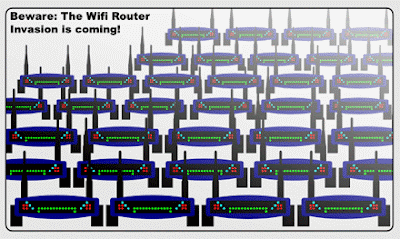 Wellington Grey has a funny pictorial on the truth about wireless devices and radiation. Unlike some postings where the writer has taken it on the chin, Mr. Grey is definitely not so tongue-in-cheek about his stance on the issue - there is no problem with WiFi radiation.
Wellington Grey has a funny pictorial on the truth about wireless devices and radiation. Unlike some postings where the writer has taken it on the chin, Mr. Grey is definitely not so tongue-in-cheek about his stance on the issue - there is no problem with WiFi radiation.Now some disagree. For example, the president of Lakewood University did, when he banned WiFi on campus 'for the sake of the students'. And a recent BBC study, mainly directed at the impact on schools, found that radiation levels from WiFi could be up to three times the level of mobile phone mast radiation. This, though the readings were admittedly 600 times below the government's safety limits, was enough for the chairman of the Health Protection Agency to recommend that the 'beam of greatest intensity' should not fall on any part of the school grounds. See the pattern here? It's a modern day 'Save the Children' campaign, using circumstantial evidence to make policy/political decisions.
Again, Mr. Grey comes to our collective rescue with a flow diagram that outlines the Science vs. Faith argument. Very funny, but the experts from the BBC article agree; the intensity of WiFi radiation is 100,000 times less than that of a domestic microwave oven, and sitting in a WiFi hotspot for a year results in receiving the same dose of radio waves as making a 20-minute mobile phone call. Based on the evidence, let's worry about something we can actually measure. You know, for the children's sake. :: BBC News :: Wellington Grey
















.gif)





